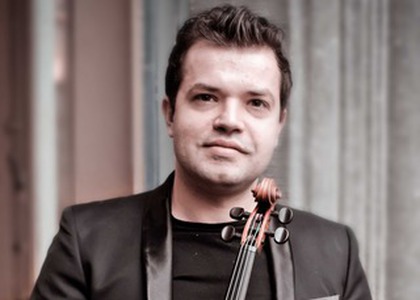> Interviews

Interview with violinist George Tudorache
George Tudorache, concertmaster of the Liège Philharmonic Orchestra, performs today, May 16th, 2025, at the Radio Hall, starting at 7:00 PM. The artist will interpret the Violin Concerto in D major, Op. 35, by Pyotr Ilyich Tchaikovsky. The program presented by the National Radio Orchestra is completed by two works by Béla Bartók: Romanian Folk Dances and the Suite from the ballet "The Miraculous Mandarin". The concert will be conducted by Gergely Madaras.
You will be performing the famous Violin Concerto in D major by Pyotr Ilyich Tchaikovsky, regarded as one of the masterpieces of Romanticism. What does this music mean to you?
For me, it's a moment filled with deep emotional significance. I grew up with this concerto from the age of 14 or 15-that's when I first began to study it-and I have performed it on important stages across Europe. But to now bring it, for the first time, before the audience in Bucharest, in the Radio Hall, is something special. It's a homecoming for me, with an artistic experience formed through years of hard work and travel, but with my soul always connected to my roots.
In fact, the Tchaikovsky concerto already reveals, in its first part, all the technical aspects of a musician or violinist and showcases them from every perspective.
The concerto was initially considered impossible to perform… What are the main challenges for a performer?
The main challenges, especially in the first part, involve all that means thirds, sixths, octaves, tenths-so, the basic technical elements of violin playing that are studied from the very beginning. And it leads us to a final movement that is truly diabolical, with very few moments to breathe. There are very lyrical sections-we can call them our moments of rest-but the finale is a marathon, so to speak, for all violinists.
You've performed on major stages around the world. What does it feel like for you to return to the country, to the stage of the Radio Hall?
It's an emotional experience, of course, but I will truly feel the warmth of the people, of my fellow countrymen. I'm sure I will be very supported-I'm convinced of that. But I will try to offer the Romanian audience a version as original and as beautiful as possible.
You are the concertmaster of the Royal Philharmonic Orchestra in Liège, and tonight you will appear on the stage of the Radio Hall as a soloist. How do you feel about stepping into this role?
It's a challenge for every member of the orchestra, whether you're the concertmaster or part of the tutti section. When you want to showcase your soloist qualities, you need to be in top shape-you have to be… a true professional athlete. You must maintain a very healthy lifestyle, and have great endurance, because all the work you present at that moment has to meet the highest standards. It's a challenge, but the satisfaction is all the greater when you succeed in achieving your goal of delivering the strongest performance possible for the audience, the conductor, and the orchestra musicians.
This isn't your first collaboration with conductor Gergely Madaras…
Of course. He is currently our music director at the Royal Philharmonic Orchestra of Liège, since September 2019. This is his final year as music director, and I had the pleasure of collaborating with him in Liège, in our own orchestra, when we performed the Sibelius Concerto in September 2022.
Translated by Sorana Andreea Dumitrescu,
University of Bucharest, Faculty of Foreign Languages and Literatures, MTTLC, year I
Corrected by Silvia Petrescu














